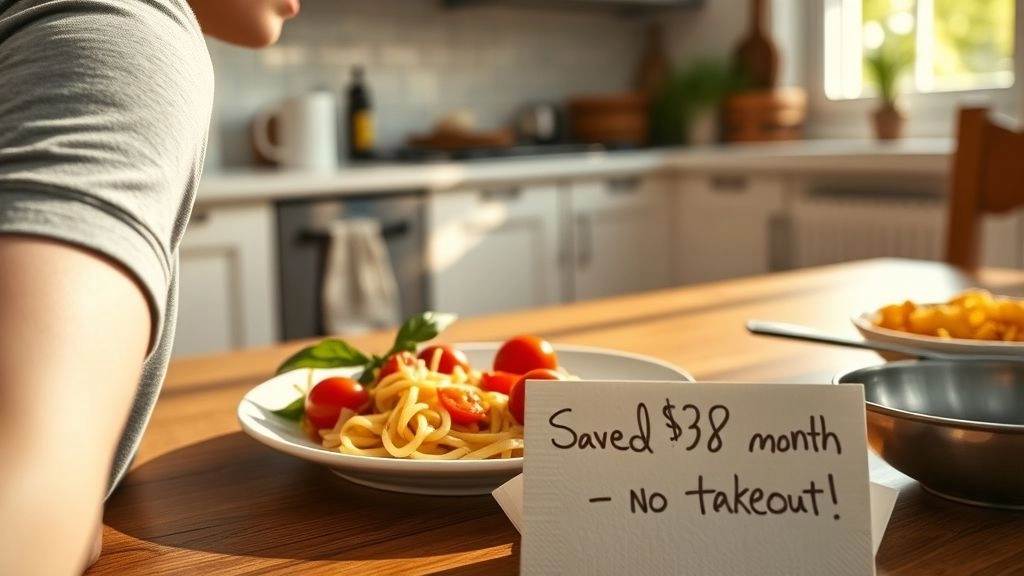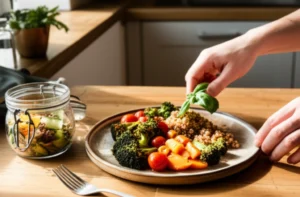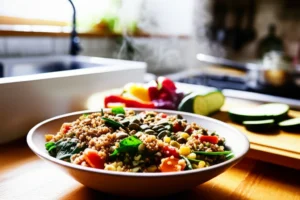Is That Takeout Worth It?
Here’s what I want you to do. Picture opening your banking app on a lazy Sunday. Maybe you’re still in pajamas, sipping coffee you brewed at home. You start scrolling…and, oof. Another week, another pile of charges: “Mango Thai – $38.27”, “Speedy Sushi – $24.10”, “Latte Shack – $7.75”. Does it ever just hit you? That creeping “where did my money go” feeling?
It’s not just you. I’ve been there—too many times. The “quick” pizza order that turns into a $50 tab because you added garlic knots and a soda… plus delivery… plus tip. I can laugh about it now, but at the time, it hurt. We all want to enjoy food, but do you really save money not eating out? Let’s dig into it together. No judgment, just real talk and some life-changing stories. Grab your mug—let’s get cozy and chat.
What’s the Real Cost?
Is Cooking Actually Cheaper?
So, is eating out a waste of money? Here’s the simple, not-so-shocking answer: yeah, eating at home saves cash. But just how much?
| Restaurant/Takeout | Home-Cooked | |
|---|---|---|
| Average Cost Per Meal | $15–$20 | $3–$6 |
| Annual Cost (1 meal a day) | $5,475–$7,300 | $1,095–$2,190 |
(And that’s just for one meal a day. Eat out more? Multiply accordingly—and try not to fall off your chair.) These numbers aren’t just math on a screen: research on spending habits says the average home meal is $4, while eating out is $20 per person. That’s a 5x increase, just for the convenience and—let’s be honest—less dishwashing.
But maybe, like me, you’re a sucker for those little extras (boom, delivery fees). Wondering where the money leaks out? See for yourself in Do you really save money not eating out because of delivery surcharges and sneaky app fees that pile on $5 here, $3 there, and suddenly, your “quick burger” is a $40 event.
Why Is It So Expensive?
I asked myself that exact question during one of those “why did I just pay $60 for two people?” restaurant nights. Turns out, you aren’t just paying for food—the restaurant bakes in labor, rent, supplies, all the stuff you sort of forget about when the waiter drops off your plate. Food industry insiders admit: most menu items are marked up at least 300% (money statistics).
That’s bonkers, right? Suddenly, “No eating out for a month” doesn’t sound so crazy.
How Much Can You Really Save?
Frugal Friends Spill All
I’ll be honest… I love a good challenge. So I fell into a Reddit rabbit hole, asking, “Do you really save money not eating out?” The answer: oh yes, and sometimes a lot. One person saved $100 in just two weeks. Another couple cut out unplanned takeout and pocketed $200–$300 a month. There’s even a guy whose brother managed to buy a used SUV with his savings after just a couple months of no eating out (frugal community chatter).
Wild. Kind of makes you want to rummage through your own bank statements, doesn’t it?
No Eating Out For A Month: The Real-World Experiment
Okay, here comes my confession: I tried the “no eating out for a month” gig last year. At first, it felt like a punishment (ugh, another PB&J?)… but by the end of the month, I was honestly pumped. My partner and I saved enough to cover a utility bill and a bit more went toward our emergency fund. And you know what? We actually started enjoying dinnertime more—less stress, more creativity, better leftovers (cold pasta salad at midnight, anyone?).
I know I’m not alone. Search through any “no eating out for a month” thread and you’ll find people saving $200, $400, even $500. Some even feel healthier (bonus win!). And that’s straight from the horse’s mouth, not some finance guru trying to sell you a budgeting app.
Yearly Numbers That’ll Make Your Jaw Drop
Let’s not sugarcoat it. If you eat out often, this habit quietly eats up your budget. The U.S. Bureau of Labor Statistics has tracked the numbers, and the average American household drops about $3,600 annually on dining out. Yes, really. That’s a used car, a vacation, or a nice chunk of debt gone. Or a year’s worth of homemade lattes if you want to keep things on-brand.
As one Quora commenter brilliantly put it: stop eating out, toss that extra $70/week into a savings account, and you could see $4,000 in your bank after a year. Or, you know, a down payment on a dream vacation… or finally buying that air fryer you keep eyeing for “healthy at-home fries.”
The math? It’s not even fancy. It’s just food for thought (literally and figuratively):
| Fast Food & Restaurants Per Week | Savings in 1 Year |
|---|---|
| $50 | $2,600 |
| $70 | $3,640 |
| $100 | $5,200 |
But… Is Eating Out Really A Waste?
It’s Not Just About Money
Listen…I’m not here to guilt you into never eating out. Sure, there are benefits of not eating out: you save loads, eat a tad healthier, and maybe even stress less when the check comes. But food is also about fun, connection, and treating yourself. Some memories just taste better in a restaurant booth under twinkle lights, you know?
But let’s be honest: convenience is expensive. My old habit of “treating myself” after a long day? It added more stress than joy when I looked at my account balance. So these days, if I choose to eat out, it’s intentional—a celebration, not a crutch. What about you? Have you ever noticed you turn to takeout when life gets a little wild?
Easy Ways to Eat Out Less
How to Stop Eating Out and Save Money (Without Feeling Miserable)
Here’s where I get a bit nerdy (in a good way). Tracking what you spend on food can be, well… awkward at first. But it’s like ripping off a Band-Aid. I promise, it’s worth it. Try a pen and notepad, your phone’s notes app, or an old-school spreadsheet on your laptop. Find a way that feels natural to you.
I recommend poking through how to stop eating out and save money for even more tips that aren’t complicated or “just for foodies.” The key? Simple wins. Buy some premade meals at the grocery store for those busy nights. Batch-cook on Sundays, then pat yourself on the back every Thursday when you have dinner ready and zero urge to hit the drive-thru.
Meal Plan Like A (Lazy) Pro
Not going to lie—meal planning used to sound like a punishment. But it saves me so much stress (and dollars) now. Try this: rotate simple dinners (like tacos on Tuesdays, pasta on Thursdays). Use leftovers differently (“tonight’s chili becomes tomorrow’s chili mac!”). Get kids involved, or your partner, or your roommate, or just pop in your favorite podcast while you chop veggies.
Want more details on planning a week of cheap, healthy meals? Sites like Berry Street show how a few dollars and a little creativity can stretch your groceries more than you’d think. (Spaghetti with homemade sauce, leftover frittatas, and good old sandwiches—they all add up.)
Yes, You Can Still Make It Fun
No, you won’t miss restaurants forever. Try making your favorite takeout at home—Google “Chipotle burrito copycat” and thank me later. It’s honestly kind-of a game, and the leftovers taste even better the next day. And, if you want a reason to celebrate, pick one night a month for an at-home “dine-in” treat. Light a candle. Use the “fancy” plates. Dessert you made (or bought from the bakery…no shame!). It scratches the itch without the blow to your wallet.
Want more? There’s a bunch of low-stress hacks packed in how to stop eating out and save money. You don’t need to micro-manage every penny; you just need a plan that works for real humans living real, busy lives.
Health Perks? Yep, That Too
Lighter Wallet, Healthier Self
Quick fun fact: nearly everyone I’ve met who tried eating out less also dropped a few pounds (or just felt better, energy-wise). The benefits of not eating out sneak up on you—more veggies, less grease, and you control the salt. One Redditor said they lost weight and saved $300 in the first month. If there’s ever a win-win…that’s it.
Building Habits That Actually Stick
Here’s where most people get stuck. You try, you slip, you think, “Well, that was fun for a week.” Forget perfection. Nobody gets it right every time. The trick? Make it sustainable. Like, once you see what you save by bringing lunch to work for two weeks, you probably won’t rush back to daily drive-thrus—especially if you bank the difference (try a separate “reward” account just for this!).
If you’re feeling inspired, read up on do you really save money not eating out because of real-life stories and extra budgeting ideas.
Ready to Try It Yourself?
So, do you really save money not eating out? Let’s be blunt: yes, you can. Sometimes a little, sometimes a ton. Even a small commitment (no eating out for a month, anyone?) can put a surprising amount back in your pocket. Plus, side effects may include weight loss, cooking confidence, and discovering that your kitchen is actually a pretty sweet place to hang out.
Does it take effort? Sure. Will you slip up now and then? Of course. But every time you choose “fridge leftovers” over takeout, that’s a win for your wallet—and your goals. Whether it’s paying down debt, saving for a vacation, or just feeling less stressed about bills, it’s worth a shot. Honest.
So here’s my challenge to you: try it for a week. Or a whole month if you’re feeling bold. Track your savings. Make it fun (theme nights, build-your-own-pizza parties, pretty meal pics for your friends). And, if you slip? Laugh. Tomorrow is a new day. The next home-cooked meal is never far away… and neither is your next bonus deposit into “future fun fund.”
Let me know: what’s your one trick for skipping the restaurant and loving it? If you need more ideas, do you really save money not eating out because of has even more inspiration to kickstart your frugal food journey. Good luck—you’ve totally got this!













